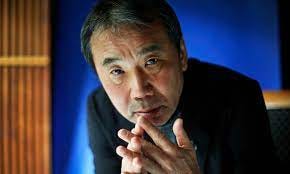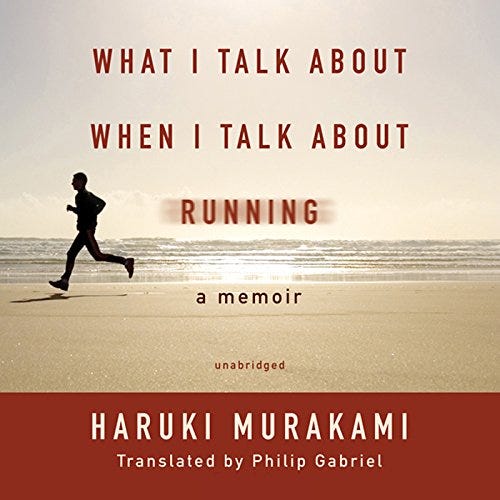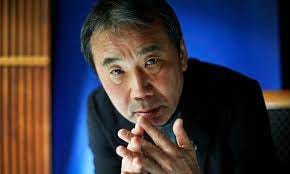How author Haruki Murakami quit smoking (#27)
What the Japanese author can teach us about the power of priority
I couldn’t very well keep on smoking and continue running
When Japanese author Haruki Murakami changed his life, he was 33 years old.
At the time, Murakami, now one of Japans best-selling novelists, owned a small jazz bar in Tokyo with his wife. But one spring afternoon at a baseball game, he thought to himself, maybe I could be a writer. So he gave it a shot.
Murakami entered a short story into a writing contest, submitted, and won. After that, he wrote his first novel, which received a small, but warm reception. But that was all he needed—he decided to go at it full time.
But once he started to establish himself as a writer, Murakami noticed an issue. His old life —physical habits, lifestyle, friends—started to clash with his new one. Going to sleep at 3AM was fine for a jazz bar owner, but not a writer. Being in poor physical shape, he noticed, hurt his mental stamina.
Murakami had to decide—did he really want to be a writer? What was he willing to sacrifice? And how important was it?
He wrote about this change in his memoir, What I Talk About When I Talk About Running.
And it is the subject of todays OGT.
The Power of Priority
A problem arose, though, with my decision to become a professional writer: the question of how to keep physically fit.
Murakami noticed a couple things about writing, very quickly.
One thing, whereas he used to be very active at work—on his feet all day in the bar— he was now sedentary eight hours per day. And he started to pack on some pounds.
I tend to gain weight if I don’t do anything. Running the bar required hard physical labor every day, and I could keep my weight down, but once I started sitting at my desk all day writing, my energy level gradually declined and I started putting on the pounds. If I wanted to have a long life as a novelist, I needed to find a way to keep fit and maintain a healthy weight.
To do this, Murakami decided to pick up running.
Running has a lot of advantages. First of all, you don’t need anybody else to do it, and no need for special equipment. You don’t have to go to any special place to do it. As long as you have running shoes and a good road you can run to your heart’s content.
Given its convenience, and being that he either didn’t have access to, or interest in any sort of sport or weights, running was his default option.
Once he started, however, it led to more problems. Including brining attention to his smoker’s lungs.
Back then I was smoking sixty cigarettes a day. All my fingers were yellow, and my whole body reeked of smoke. This can’t be good for me, I decided.
He knew he’d have to give it up to keep running. But how to give it up?
Giving up smoking was a kind of natural result of running every day. It wasn’t easy to quit, but I couldn’t very well keep on smoking and continue running. This natural desire to run even more became a powerful motivation for me to not go back to smoking, and a great help in overcoming the withdrawal symptoms. Quitting smoking was like a symbolic gesture of farewell to the life I used to lead.
In just a year or two, Murakami completely changed his life.
He gave up, not only smoking, but he started exercising every day, turned himself into a 5 AM morning person, and overhauled his diet. As he tells it, it wasn’t as much about personal will. It was about focusing on what was most important, and then working backwards from there.
I’m struck by how, except when you’re young, you really need to prioritize in life, figuring out in what order you should divide up your time and energy. If you don’t get that sort of system set by a certain age, you’ll lack focus and your life will be out of balance.
I placed the highest priority on the sort of life that lets me focus on writing.
The OGT
I’m currently reading another memoir of sorts by John Paul Getty (once the richest person in the country).
Getty also quit smoking in a very short amount of time. He did it after noticing a clash between it and who he wanted to be. It was highlighted by a particularly desperate attempt to get a cigarette:
There I stood, a supposedly intelligent human being, a supposedly responsible and fairly successful businessman who considered himself sensible enough to give other people orders. Yet I was ready to leave my comfortable hotel room in the middle of the night and slosh a dozen blocks through a driving rainstorm for no other reason than that I wanted a cigarette –because I felt that I “had” to have one.
He quit the next day.
People often mix up the terms “priority” and “value.”
When some says, “you’ve got to get your priorities straight,” some feel you could easily substitute in “values” for the word “priorities,” and it would mean the same thing. But it doesn’t.
What you value is what you feel is important. Priorities are those values you feel most important.
The problem with values is you have many: your family, creativity, making a good living, being in good health, fun—the list goes on. And because there are so many, they inevitably clash. As one psychologist hilariously put it,1 “See, here’s ya’lls problem: on the one hand, ya’ll want to be skinny, but on the other hand, ya’ll love eatin'‘ cake.”
Murakami loved his bar and late night jazz life, but wanted to be a writer. He loved not running 40 miles per week, but he wanted to be a writer. He loved eating whatever he wanted, and staying up late, and smoking cigarettes— but he wanted to be a writer.
I couldn’t very well keep on smoking,” he wrote, “and continue running.
So what did he do? He started at his chief priority—the thing he thought most important—and made a decision: whatever clashes with writing loses. Whatever enhances it wins.
I placed the highest priority on the sort of life that lets me focus on writing.
And then he did the hardest part: he followed through.
For more on priority and what matters, read F. Scott Fitzgerald’s advice to his young daughter, Seth Godin on how to quit what doesn’t matter, and writer Steven Pressfield on refining your core idea.
It was a Tony Robbins seminar and the speaker was Joseph McClendon III, a psychologist, apparently ‘of the stars’





